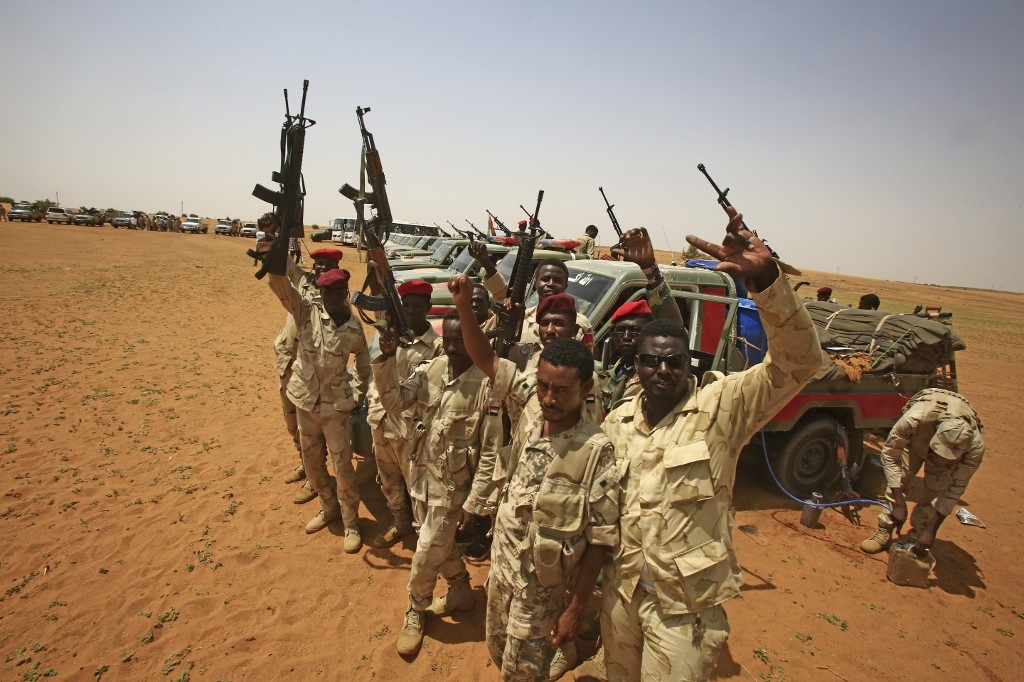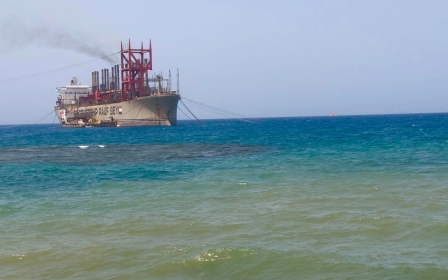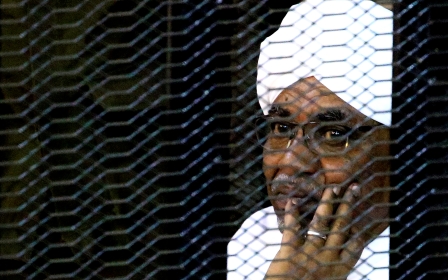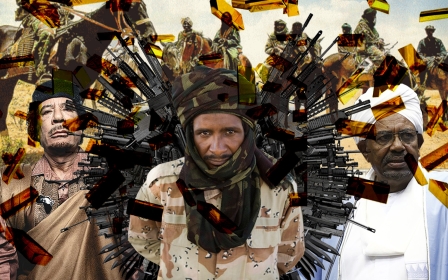From singing children to free transport: Sudan's battle for public opinion

In a red dress and with a military cap on her head, a young girl sings an ode to the Rapid Support Forces (RSF), Sudan’s notorious paramilitary, in a video released as part of its latest public relations push.
“In Kordofan, the Support [RSF] came... in Darfur, the Support came," the girl chants, apparently standing in a Khartoum field the RSF used as a base when it took control of the capital earlier this year.
She reels off a list of places around Sudan. Many of these communities, Sudanese social media users pointed out, received the RSF not as benevolent beings coming to their aid, but as a menacing force deployed by the government to brutalise them.
In its current incarnation, the RSF has been accused of massacres this year, and of genocide in its previous form as the Janjaweed militias deployed in Darfur. But on social media it now promotes work plugging the country’s gap in social and health services, providing public transport and striking deals with clans around the country.
New MEE newsletter: Jerusalem Dispatch
Sign up to get the latest insights and analysis on Israel-Palestine, alongside Turkey Unpacked and other MEE newsletters
A Sudanese girl sings in a video promoting the RSF, called 'Since the evening the RSF came'
Both social and traditional media have become key to the many parties involved in the new power-sharing system established after protesters succeeded in forcing out three-decade ruler Omar al-Bashir in April.
The system has ceded some space to civilian leaders, including a cabinet led by Prime Minister Abdalla Hamdok, but the roles, ambitions and the internal balance of power is unclear.
While former UN economist Hamdok has appeared on the global stage, seeking international support for a transformation of Sudanese politics and its shattered economy, General Abdel Fattah al-Burhan, who chairs the parallel sovereign council, has projected an image of senior statesman, heading oath-taking ceremonies for new ministers and peace talks with rebel groups.
Experts say these campaigns reflect the balance of power between the military and civilians, with each eager to connect with the public that protested almost daily, for months, for a transformed Sudan.
“It’s clearly a forced marriage, the security forces were with Bashir until the very last minute and even after Bashir was ousted showed they had very little appetite for reform, especially with the way they carried out the massacre on 3 June,” said Murithi Mutiga, project director for the Horn of Africa at analysts Crisis Group, referring to the military’s violent dispersal of a sit-in that killed more than 100 protesters and is widely thought to have been the work of the RSF.
“The civilians may be dealing with a weak hand but they have the strength of public opinion and very deep and broad public support. Both sides need each other now.”
'Spreading fake news'
Since he was appointed prime minister in August, Hamdok has engaged in an international charm offensive that quickly involved verified social media accounts for a man who had previously been relatively obscure, and regular posts in English, alongside Arabic.
Hamdok celebrated meetings and agreements with international leaders at the UN General Assembly in New York in September and posted videos of him speaking on panels talking about democratic change and freedom of the press after decades of Sudanese isolation.
But while the new prime minister has busied himself on the international stage, the RSF has been active domestically, utilising social media to connect with a population hostile to both the group itself and its leader Mohammed Hamdan Dagolo, known more popularly as Hemeti.
“The message and the theme is clear, that the RSF and Hemeti are fully able to replace the government and play its role in providing the basic services such as health and security needs,” Mohamed Suliman, a US-based activist who has been campaigning for months to have the RSF’s social media pages taken down, told Middle East Eye.
They have succeeded in having the group’s website blocked and Twitter account removed but Facebook, YouTube and Telegram accounts still promote messages about the RSF providing free transport or vaccinations in rural Sudan, which Hemeti has positioned himself as a champion of.
Even during this campaign, RSF fighters have been accused of beating hospital workers, attacking protesters and dumping dangerous chemicals into water sources near the site of an environmental protest against an allegedly RSF-owned gold mine.
“[The] RSF militia is spreading fake news through their internet content, in addition to concealing and distorting clear facts such as the responsibility of the RSF in the Khartoum massacre,” said Suliman.
A recent survey by Stanford University's Internet Observatory reviewed 22 Sudanese websites, leading some to be removed, that found associations to Russia-linked companies accused of fake news in the past, as well as Wagner, a Russian military contractor with close ties to the Sudanese military.
Goodwill and the economy
The focus of Hamdok’s international trips and much of his messaging has been on reviving Sudan’s economy, damaged by corruption, sanctions and a reliance on oil that left the country stranded when the majority of its oil resources were lost with South Sudan’s independence in 2011.
His finance minister, Ibrahim Elbadawi, a former World Bank economist, is still abroad looking for support for this economic programme.
According to Yousif al-Mahdi, a Sudanese economist, having Hamdok playing the international stage while the generals focus on regional dynamics suits both parties - but the economy is crucial to all.
“The economy will make or break this government. I think this government is mortgaging itself on external financial support. I think it’s a dangerous game,” said Mahdi.
He said the relationship with the military appears to be good at the moment, but was imbalanced, and the real test would be how the generals reacted to Hamdok pushing for more concessions, especially on military spending.
Mahdi said the types of economic reforms that have been floated under the government, like subsidy cuts, could end up damaging livelihoods and increasing some of the grievances that fuelled protests against Bashir late last year. Ultimately, that could harm the public's opinion of the government.
“If there’s a loss of goodwill with the [opposition Forces of Freedom and Change coalition] FFC, they might look differently at the military. Not that they’ll fall into their arms but they’ll reassess their view,” said Mahdi.
Filling the gap
The fear many supporters of Sudan’s uprising have is that if Hamdok fails and is blamed for the persistence of low living standards, the RSF’s promotion of itself as a social service provider filling the gap left by the state could change its relationship with the public - especially as Hemeti plays up his background from a nomadic herding community in Darfur, rather than the Khartoum elite.
Sudanese newspapers have reported tribes signing up to join the RSF, while the group’s own channels regularly describe Hemeti as the vice president of the sovereign council, elevating him above the rest of the council, which is split between military and civilian members, despite no such position existing.
“From what we understand, from people on the ground, is that the RSF has accumulated a lot of power, Hemeti is almost acting as though he’s running a state within a state,” said Mutiga, who led the writing of a recently published Crisis Group report on the trajectory of Sudan’s power-sharing government.
Hemeti also benefits from funding from the Gulf due to his provision of RSF fighters for the war in Yemen, and controls Sudan’s borders because of the RSF’s mandate under Bashir.
“What Hemeti has been doing over the past few months is positioning himself as the champion of rural Sudan, which is quite an irony considering he is accused of leading militias that are accused of atrocities in Darfur,” he said.
Hemeti and the RSF are also thought to possess vast riches, including gold mines they seized from rival Janjaweed leader Musa Hilal in 2017, as well as in the Nuba mountains, another conflict zone.
Hemeti’s wealth and power could prove crucial in the future and many believe the RSF’s public relations campaign is about showing they are ready to support the population if the state fails.
“I think that Hemeti is planning ahead, he has far more money than anyone else and he has far more reach than anyone else geographically,” said Mahdi.
“I think he’s been very clever to try to win over communities. He’s not going to win over the military council, he’s not going to win over the social media elites, but he’s bypassing them and going straight to the communities.
“During this gap in social service provision at the moment, he’s filling a need and that’s going to have a lasting impact.”
Middle East Eye delivers independent and unrivalled coverage and analysis of the Middle East, North Africa and beyond. To learn more about republishing this content and the associated fees, please fill out this form. More about MEE can be found here.




